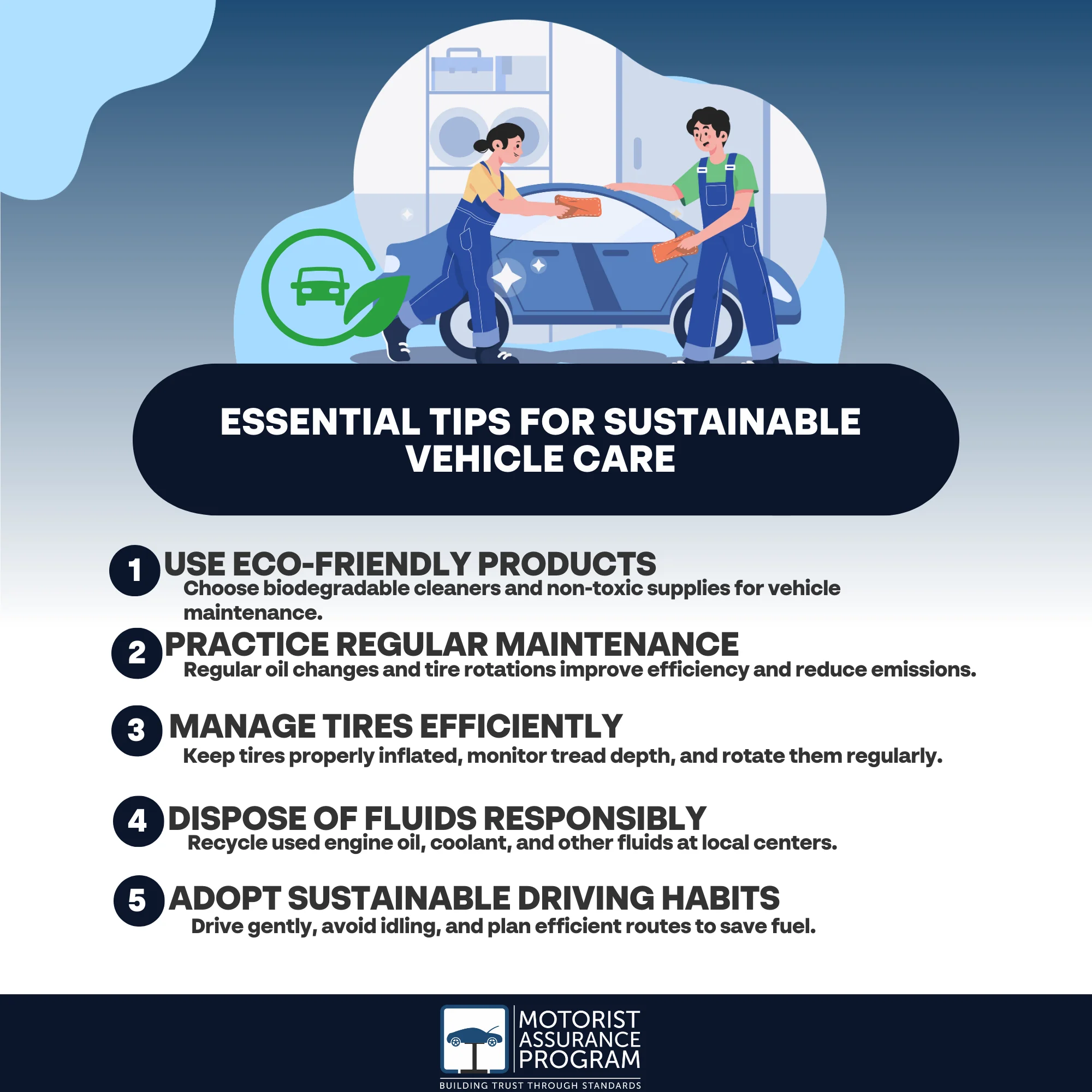Sustainable vehicle care is essential for enhancing your car’s performance while protecting the environment. Start by choosing eco-friendly cleaning products and biodegradable supplies, which minimize harmful impacts. Regular vehicle inspections help catch issues early, prolonging your car’s life and improving fuel efficiency. Proper tire management, like checking inflation and rotating tires, boosts your vehicle’s efficiency and reduces emissions. Dispose of fluids responsibly to help maintain ecological balance. Adopting sustainable driving habits, such as gentle acceleration and minimizing idling, further enhances fuel economy. By embracing these strategies, you not only support sustainability but also enjoy a smoother, more efficient ride.
 There’s plenty more to explore.
There’s plenty more to explore.
Key Takeaways
-
Regular maintenance, including oil changes and tire rotations, improves fuel economy and reduces emissions, contributing to a sustainable vehicle care routine.
-
Choose eco-friendly cleaning solutions like vinegar, baking soda, and Castile soap to minimize harmful chemical usage while maintaining vehicle cleanliness.
-
Practice efficient tire management by maintaining proper inflation, monitoring tread depth, and rotating tires regularly to enhance vehicle performance and sustainability.
-
Dispose of fluids like engine oil and coolant responsibly by utilizing local recycling programs to prevent environmental contamination.
-
Adopt sustainable driving habits, such as planning trips and accelerating gently, to minimize fuel consumption and reduce carbon emissions.
Importance of Eco-Friendly Maintenance
While cars are vital for modern life, maintaining them can greatly impact the environment. By choosing eco-friendly maintenance practices, you not only keep your vehicle running efficiently but also help reduce your carbon footprint. Utilizing resources from fuel economy information can guide you in making informed decisions about your vehicle’s maintenance.
Using eco-friendly materials, like biodegradable cleaners and non-toxic oils, minimizes harmful chemicals that can leach into the soil and waterways. These choices make a difference in preserving our planet’s health.
Incorporating green technology in your vehicle care routine further enhances your sustainability efforts. For instance, utilizing energy-efficient tools for repairs and maintenance can lower energy consumption and reduce waste.
Regular maintenance, like oil changes and tire rotations, guarantees your car operates at peak efficiency, leading to better fuel economy and fewer emissions.
Choosing Sustainable Products
When it comes to caring for your vehicle sustainably, choosing the right products makes all the difference. By opting for eco-friendly cleaning solutions, you can guarantee that your vehicle maintenance has a reduced impact on the environment.
Eco-Friendly Cleaning Solutions
Choosing eco-friendly cleaning solutions and biodegradable detailing supplies for your vehicle not only protects the environment but also guarantees a healthier space for you and your passengers. By opting for natural cleaning alternatives, you can minimize harmful chemicals that can linger in your car.
These environmentally safe products break down more easily, reducing the impact on our planet while keeping your car spotless and fresh.
Here are some great options to take into account:
-
Vinegar and Water: A powerful duo that tackles stains and odors.
-
Baking Soda: Perfect for deodorizing carpets and upholstery.
-
Olive Oil: A wonderful, natural alternative for polishing wooden surfaces.
-
Castile Soap: A versatile cleaner that’s safe and effective for various surfaces.
-
Essential Oils: Add pleasant scents and antibacterial properties to your cleaning routine.
When you make the switch to these eco-friendly solutions, you’re not just caring for your vehicle; you’re also contributing to a healthier planet.
Biodegradable Detailing Supplies
Using biodegradable detailing supplies is a crucial step in guaranteeing your vehicle care is as green as possible. Opt for biodegradable waxes that not only provide a protective layer for your vehicle but also break down naturally, leaving no harmful residues behind. These waxes are designed to enhance your vehicle’s shine while being kind to the environment.
In addition to waxes, consider investing in eco-friendly brushes. These brushes are made from sustainable materials that minimize plastic waste and maximize performance. Their design guarantees effective cleaning while reducing your carbon footprint.
Using these brushes alongside biodegradable products means you’re taking extensive steps toward sustainable vehicle maintenance.
Sustainable Tire Care Options
How can you guarantee your tires are as eco-friendly as the rest of your vehicle? By choosing sustainable tire care options, you can greatly reduce your environmental impact.
Start by selecting eco-friendly tires made from sustainable materials. These tires often use fewer harmful chemicals and can enhance fuel efficiency.
Consider these sustainable tire care options:
-
Tire Recycling: Look for local programs that recycle old tires instead of letting them end up in landfills.
-
Proper Inflation: Keeping your tires properly inflated improves fuel efficiency and extends tire life, reducing waste.
-
Regular Rotations: Rotating your tires every 5,000 to 7,500 miles promotes even wear and prolongs their lifespan.
-
Low Rolling Resistance Tires: These specialized tires can improve your vehicle’s fuel economy, making them a smart eco-friendly choice.
-
Tire Maintenance Kits: Invest in kits that include eco-friendly products like biodegradable tire cleaners and conditioners.
Regular Vehicle Inspections
Regular vehicle inspections are crucial for ensuring your car runs smoothly and safely. By scheduling regular preventive checks, you can identify potential issues before they turn into costly repairs.
Aim for an inspection frequency that suits your vehicle’s needs—typically, every 5,000 to 10,000 miles is a good benchmark. During these inspections, mechanics will check essential components like brakes, fluids, and lights, ensuring everything functions properly.
This proactive approach not only extends the life of your car but also enhances its fuel efficiency, contributing to a more sustainable environment.
Don’t wait until a warning light pops up on your dashboard. Take charge of your vehicle’s health by committing to regular inspections.
Remember, a well-maintained vehicle isn’t just a personal investment; it’s a step toward a more sustainable future for everyone.
Efficient Tire Management
Taking care of your tires is essential for both safety and sustainability.
Regular tire rotation, maintaining proper inflation levels, and monitoring tread depth can greatly extend their lifespan and improve your vehicle’s efficiency.
Regular Tire Rotation
Tire rotation is a crucial aspect of efficient vehicle management that can greatly extend the life of your tires. By regularly rotating your tires, you can manage tire wear effectively, ensuring even distribution of tread wear. This practice helps to sustain your vehicle’s performance and safety.
Here are some key benefits of regular tire rotation:
-
Improved handling: Balanced tire wear enhances your vehicle’s stability.
-
Increased longevity: Extending tire life saves you money on replacements.
-
Better fuel efficiency: Even tread wear can improve gas mileage.
-
Enhanced safety: Properly maintained tires reduce the risk of blowouts.
-
Smoother ride: Regular rotation contributes to a more comfortable driving experience.
Proper Inflation Levels
Maintaining proper inflation levels is just as important as regular tire rotation for efficient tire management. When your tires are inflated to the recommended tire pressure, you’re not just guaranteeing a smoother ride; you’re also enhancing fuel efficiency.
Under-inflated tires create more rolling resistance, leading to increased fuel consumption. Conversely, over-inflated tires can result in uneven wear and reduced traction, which could compromise your safety.
You should check your tire pressure at least once a month and before long trips. A simple tire pressure gauge can help you monitor your inflation levels easily. Remember that tire pressure can fluctuate with temperature changes, so it’s vital to adjust accordingly.
The inflation benefits extend beyond just performance. Properly inflated tires can enhance your vehicle’s lifespan, saving you money in the long run.
Tread Depth Monitoring
Keeping an eye on your tread depth is essential for safe driving and ideal vehicle performance. Regular monitoring guarantees your tires provide the grip and handling you need on the road.
When tread depth decreases, it can lead to longer stopping distances and reduced traction, especially in wet conditions. That’s where tread indicators come in—they’re built into your tires and help you gauge when it’s time for a tire replacement.
Here are some tips for effective tread depth monitoring:
-
Use a penny: Insert a penny into the tread; if you see Lincoln’s entire head, it’s time for new tires.
-
Check the tread wear bars: These are small indicators that show when your tread is too low.
-
Rotate your tires regularly: This promotes even wear and extends tire life.
-
Keep an eye on tire pressure: Proper inflation can help maintain tread depth.
-
Schedule regular inspections: Professional check-ups can spot issues before they become serious.
Eco-Conscious Fluid Disposal
Proper fluid disposal is essential for eco-conscious vehicle care. When it comes time to change your engine oil, coolant, or brake fluid, remember that these substances can be hazardous waste. Improper disposal can harm the environment, so it’s vital to handle them responsibly. Many local recycling programs accept used automotive fluids, making it easier than ever to contribute to a sustainable future.
Start by locating a recycling facility or program in your area. They often provide designated containers for different types of fluids, ensuring they’re handled correctly. If you’re unsure where to go, your vehicle’s manual or local auto shops can point you in the right direction. Even auto parts stores frequently have drop-off options.
Consider also discussing fluid disposal with your mechanic during routine maintenance. They might offer services for proper disposal or direct you to nearby recycling programs.
Minimizing Emissions Through Care
Taking care of your vehicle goes beyond responsible fluid disposal; it also plays a significant role in minimizing emissions.
By adopting smart maintenance practices, you can contribute to emission reduction and enhance your vehicle’s longevity. Here’s how you can get started:
-
Regular Oil Changes: Fresh oil keeps your engine running smoothly and reduces harmful exhaust emissions.
-
Proper Tire Maintenance: Keeping your tires inflated to the correct pressure improves fuel efficiency and lowers emissions.
-
Air Filter Replacement: A clean air filter guarantees your engine breathes properly, promoting better performance and lower emissions.
-
Engine Diagnostics: Regularly checking your engine for issues helps catch problems early, preventing excessive emissions.
-
Fuel Quality: Using high-quality fuel can lead to cleaner combustion and reduced emissions.
Sustainable Driving Habits
When it comes to sustainable driving habits, you have the power to make a real difference.
By adopting eco-friendly driving techniques and efficient fuel usage strategies, you can reduce your carbon footprint while saving money at the pump.
Let’s explore how small changes in your driving can lead to a more sustainable future for everyone.
Eco-Friendly Driving Techniques
Adopting eco-friendly driving techniques can considerably reduce your vehicle’s environmental impact while also improving fuel efficiency.
By making small changes in how you drive, you can contribute to a healthier planet and save money at the pump. Here are some effective strategies you can implement today:
-
Plan your trips: Use navigation apps to find eco-friendly routes that minimize idling and reduce distance.
-
Accelerate gently: Take your time when accelerating to avoid wasting fuel and increase your efficiency.
-
Use regenerative braking: If your vehicle has this feature, take advantage of it. It captures energy when you slow down, extending your battery life and improving overall efficiency.
-
Maintain steady speeds: Use cruise control on highways, which helps you maintain a constant speed and reduces fuel consumption.
-
Limit unnecessary weight: Remove heavy items from your trunk to enhance your vehicle’s performance and fuel efficiency.
Efficient Fuel Usage Strategies
Many drivers underestimate how their habits impact fuel consumption, but adopting efficient fuel usage strategies can lead to significant savings and reduced emissions.
You can start by integrating fuel efficient technologies into your driving routine. For instance, if you own a vehicle equipped with hybrid systems, utilize them wisely. These systems optimize fuel usage by automatically switching between gasoline and electric power, allowing you to maximize efficiency.
Another effective strategy is to maintain a steady speed. Rapid acceleration and hard braking consume more fuel, so try to anticipate traffic flow and adjust your speed smoothly.
Also, consider reducing idling time; turning off your engine when parked or waiting can save fuel. Keeping your tires properly inflated is essential too. Under-inflated tires increase rolling resistance, making your engine work harder and use more fuel.
Utilizing Renewable Energy Sources
Utilizing renewable energy sources is a game-changer for sustainable vehicle care. By harnessing options like solar charging, you not only reduce your carbon footprint but also save money in the long run.
Here are some practical ways you can incorporate renewable energy into your vehicle care routine:
-
Install solar panels on your property to charge your electric vehicle naturally.
-
Use energy-efficient chargers that minimize electricity consumption.
-
Choose eco-friendly products for vehicle cleaning, reducing the impact on water and energy.
-
Opt for renewable energy plans from your utility provider to power your home charging station.
-
Participate in community solar projects that allow you to support renewable energy without needing your own panels.
Educating Others on Sustainability
Educating others about sustainability is essential for cultivating a culture of environmental responsibility.
When you share your knowledge, you help create a ripple effect, inspiring others to adopt sustainable practices in their lives. One effective way to do this is through sustainable education initiatives and green workshops that encourage hands-on learning.
Here are some ideas to get started:
-
Host community workshops that teach eco-friendly vehicle maintenance tips.
-
Share articles and resources on social media to spread awareness.
-
Collaborate with local organizations to organize sustainability events.
-
Create a newsletter that highlights sustainable practices in vehicle care.
-
Lead by example; show others how easy it can be to go green.
Frequently Asked Questions
How Often Should I Wash My Vehicle Sustainably?
You should wash your vehicle every two weeks, following frequency guidelines. Use eco-friendly techniques like biodegradable soaps and water-saving methods to keep your car clean while minimizing environmental impact. It’s a win-win for you and nature!
Can I Use Regular Products for Eco-Friendly Maintenance?
Eco-friendly alternatives thrive just as well for car maintenance, proving that green product effectiveness isn’t just a myth—it’s the key to nurturing your ride sustainably.
What Are the Benefits of Using Biodegradable Cleaning Supplies?
Using biodegradable cleaning supplies means you’re reducing your environmental impact. These products contain biodegradable ingredients that break down easily, minimizing pollution and harm to ecosystems.
How Do I Find Local Eco-Friendly Repair Shops?
To find local eco-friendly repair shops, check community resources like online directories and social media. Look for businesses with green certification, ensuring they prioritize sustainable practices and environmentally friendly materials in their repair processes.
Are There Specific Certifications for Sustainable Automotive Products?
There eco-friendly certifications like Green Seal and Energy Star, this sustainable training ensures your automotive choices tread lightly on our planet’s fragile skin.
Conclusion
Incorporating sustainable vehicle care into your routine not only benefits the planet but also enhances your driving experience. By choosing eco-friendly products, practicing efficient tire management, and supporting green businesses, you’re making a meaningful impact. Every small step counts, so take pride in your efforts to drive sustainably. Together, we can create a cleaner, greener future for everyone on the road.


